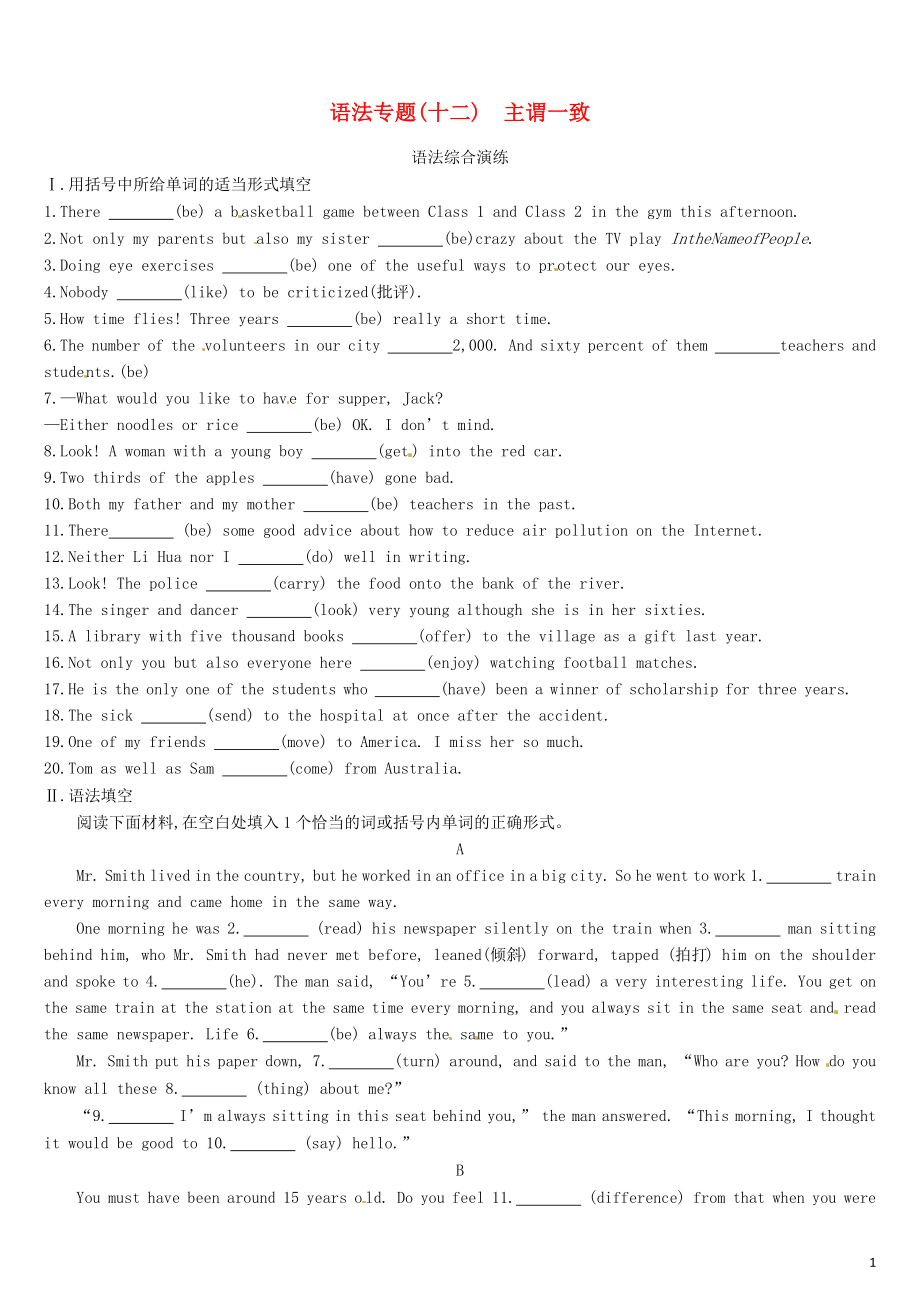《四川省綿陽(yáng)市2019中考英語(yǔ)總復(fù)習(xí) 第二篇 語(yǔ)法突破篇 語(yǔ)法專題12 主謂一致綜合演練》由會(huì)員分享�,可在線閱讀,更多相關(guān)《四川省綿陽(yáng)市2019中考英語(yǔ)總復(fù)習(xí) 第二篇 語(yǔ)法突破篇 語(yǔ)法專題12 主謂一致綜合演練(3頁(yè)珍藏版)》請(qǐng)?jiān)谘b配圖網(wǎng)上搜索�。
1、語(yǔ)法專題(十二) 主謂一致
語(yǔ)法綜合演練
Ⅰ.用括號(hào)中所給單詞的適當(dāng)形式填空
1.There (be) a basketball game between Class 1 and Class 2 in the gym this afternoon.?
2.Not only my parents but also my sister (be)crazy about the TV play IntheNameofPeople.?
3.Doing eye exercises (be) one of the useful ways to protect our eye
2�����、s.?
4.Nobody (like) to be criticized(批評(píng)).?
5.How time flies! Three years (be) really a short time.?
6.The number of the volunteers in our city 2,000. And sixty percent of them teachers and students.(be)?
7.—What would you like to have for supper, Jack?
—Either noodles or rice
3����、 (be) OK. I don’t mind.?
8.Look! A woman with a young boy (get) into the red car.?
9.Two thirds of the apples (have) gone bad.?
10.Both my father and my mother (be) teachers in the past.?
11.There (be) some good advice about how to reduce air pollution on the Internet. ?
12.Nei
4、ther Li Hua nor I (do) well in writing.?
13.Look! The police (carry) the food onto the bank of the river.?
14.The singer and dancer (look) very young although she is in her sixties.?
15.A library with five thousand books (offer) to the village as a gift last year.?
16.Not only yo
5���、u but also everyone here (enjoy) watching football matches.?
17.He is the only one of the students who (have) been a winner of scholarship for three years. ?
18.The sick (send) to the hospital at once after the accident.?
19.One of my friends (move) to America. I miss her so much.
6�����、?
20.Tom as well as Sam (come) from Australia.?
Ⅱ.語(yǔ)法填空
閱讀下面材料,在空白處填入1個(gè)恰當(dāng)?shù)脑~或括號(hào)內(nèi)單詞的正確形式�����。
A
Mr. Smith lived in the country, but he worked in an office in a big city. So he went to work 1. train every morning and came home in the same way.?
One morning he was 2. (read) his newspaper
7�、silently on the train when 3. man sitting behind him, who Mr. Smith had never met before, leaned(傾斜) forward, tapped (拍打) him on the shoulder and spoke to 4. (he). The man said, “You’re 5. (lead) a very interesting life. You get on the same train at the station at the same time every morni
8、ng, and you always sit in the same seat and read the same newspaper. Life 6. (be) always the same to you.” ?
Mr. Smith put his paper down, 7. (turn) around, and said to the man, “Who are you? How do you know all these 8. (thing) about me?”?
“9. I’m always sitting in this seat behind
9���、you,” the man answered. “This morning, I thought it would be good to 10. (say) hello.”?
B
You must have been around 15 years old. Do you feel 11. (difference) from that when you were 9 years old? Are you 12. (wonder) if you have already grown up? You may be a physical adult before you f
10����、inish studying. Some people may finish their growing at high school, 13. others are still growing after they leave school.?
Being an adult needs a long time. The more you experience, the 14. (fast) you become an adult. Even when puberty(青春期) is over and you think you are a grown-up, you’ll s
11���、till face some physical and relationship problems that you should deal 15. .?
Parents are very 16. (help) for your growing, but it’s not necessary for them to do everything for you. Sometimes you might have 17. (you) own idea. What they should do is to make sure that you have all the infor
12�����、mation to make a 18. (decide) by yourself. Of course you should do it in the right way.?
Remember, caring parents and families are the 19. (good) support you can have. Anyway/ anyhow,wish you grow up 20. (healthy) and happily.?
參考答案
Ⅰ.1.will be/is going to be 2.is 3.is
4.likes 5.is
13�、 6.is; are 7.is
8.is getting 9.have 10.were 11.is
12.do 13.are carrying 14.looks
15.was offered 16.enjoys 17.has
18.were sent 19.has moved es
Ⅱ.A [主旨大意] 本文是一篇記敘文,講述了一個(gè)有趣的故事�。住在鄉(xiāng)村的史密斯先生每天都乘坐火車去城里上班,一天,一個(gè)坐在他后面的男子突然和他打招呼……
1.by 考查介詞的用法。句意:因此他每天乘坐火車去上班,(下班)回家也是相同的方式�。介詞by后跟交通工具,表示“乘坐……”。
2.reading
14����、 考查動(dòng)詞的時(shí)態(tài)�。句意:一天早晨他靜靜地在火車上看報(bào),這時(shí)……read newspaper意為“讀/看報(bào)”,根據(jù)系動(dòng)詞was可知此處用過去進(jìn)行時(shí)��。
3.a 考查冠詞的用法�����。句意:這時(shí),坐在他后面的一位男子……此處泛指“一個(gè)”,且man以輔音音素開頭,故填不定冠詞a���。
4.him 考查代詞的用法。此處to為介詞,其后接人稱代詞的賓格形式�����。故填him����。
5.leading 6.is 7.turned 8.things
9.Because 考查連詞的用法。句意:男子回答道:“因?yàn)槲铱傋谀闵砗蟮哪莻€(gè)座位�。”此空是回復(fù)上面的問題,即解釋問題的原因���。故填Because����。
10.say 考查動(dòng)詞的用法。句意:今早我想該是打招呼的時(shí)候了����。此處的to是動(dòng)詞不定式符號(hào),故填say。
B 11.different 12.wondering
13.while 14.faster 15.with
16.helpful 17.your 18.decision
19.best 20.healthily
3
 四川省綿陽(yáng)市2019中考英語(yǔ)總復(fù)習(xí) 第二篇 語(yǔ)法突破篇 語(yǔ)法專題12 主謂一致綜合演練
四川省綿陽(yáng)市2019中考英語(yǔ)總復(fù)習(xí) 第二篇 語(yǔ)法突破篇 語(yǔ)法專題12 主謂一致綜合演練

